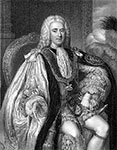Thomas Pelham-Holles
|
 |
born July 21, 1693
died Nov. 17, 1768, London, England
original name Thomas Pelham
Prime minister of Great Britain from 1754 to 1756 and from 1757 to 1762. Through his control of government patronage, he wielded enormous political influence during the reigns of the kings George I and George II.
Pelham-Holles inherited the barony of Pelham of Laughton from his father in 1712 (having assumed the name Pelham-Holles in 1711). By the time he came of age in 1714, he had become one of the wealthiest Whig landowners in England, with holdings in 12 counties and a rental income of nearly £40,000 a year. He helped bring about the succession of King George I (reigned 1714–27) and as a reward was given the title Duke of Newcastle-upon-Tyne in 1715. In 1724 Robert Walpole, the chief minister, made him secretary of state, a post he held for 30 years.
Newcastle gained even more power when his brother, Henry Pelham, became prime minister in 1743. On Pelham's death in March 1754, Newcastle was made prime minister, but England's setbacks early in the opening months of the Seven Years' War (1756–63) with France led to his resignation in October 1756. He was then created Duke of Newcastle-under-Lyme. Eight months later he again became prime minister in an uneasy coalition with his former enemy William Pitt (later 1st Earl of Chatham), who became secretary of state. While Newcastle procured parliamentary majorities in support of their ministry and handled matters of patronage, Pitt directed the war and turned initial defeat into a brilliant victory. In May 1762 Newcastle resigned and was replaced by John Stuart, 3rd Earl of Bute, favourite of young King George III. Newcastle died without issue, and the dukedom devolved on a nephew, Henry Finnes Clinton.
Newcastle was passionately devoted to the Hanoverian succession, to the cause of the Whigs, and to the game of politics for its own sake. Since party organizations hardly existed in the England of his time, the only means of giving a government cohesion and stability were the systematic management of elections and the distribution of patronage to secure parliamentary support for a particular ministry. Newcastle won a unique reputation for his skill and patience in securing a voting majority in the House of Commons by distributing posts, sinecures, and pensions. The key to his powers of patronage was his long and unbroken tenure of office, which put at his disposal the rich resources of the crown. He thus became an almost indispensable manager in all the ministries of his time.
Copyright © 1994-2002 Encyclopædia Britannica, Inc.
![]()
Sources
- Encylopedia Britannica 2002, Expanded Edition DVD
Web





